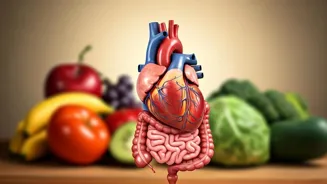The Gut-Heart Link
The human body functions like a complex network where several parts work together. The gut, or digestive system, is increasingly recognized as crucial
not only for processing food but also for influencing overall health, including the cardiovascular system. Research indicates a substantial link between gut health and heart well-being, with an imbalance in gut bacteria potentially contributing to heart problems. The gut microbiota, comprising trillions of microorganisms, affects various body functions such as digestion, immunity, and inflammation. When this microbial balance is disrupted, harmful substances can enter the bloodstream, leading to inflammation, a key factor in heart disease. Understanding this connection helps individuals adopt proactive strategies to support both gut and heart health through lifestyle modifications and dietary adjustments. Therefore, maintaining a healthy gut can positively impact cardiovascular health.
Lifestyle's Impact
Lifestyle habits have a substantial impact on gut and heart health. A balanced diet is crucial. The consumption of processed foods, high in saturated fats, and sugar can harm the gut microbiota and increase the risk of heart disease. A diet rich in fruits, vegetables, whole grains, and lean proteins promotes a diverse and healthy gut microbiome, which supports cardiovascular health. Regular physical activity is also beneficial. Exercise can reduce inflammation, improve cholesterol levels, and support a healthy gut environment. Conversely, sedentary behavior can negatively affect gut health, contributing to obesity and increasing the risk of heart disease. Managing stress is yet another important lifestyle aspect. Chronic stress can disrupt the gut microbiota and increase the risk of cardiovascular problems. Effective stress-management techniques, such as meditation, yoga, and spending time in nature, are valuable for both gut and heart health.
Foods to Embrace
Specific foods and dietary patterns are beneficial for promoting both gut and heart health. Incorporating a variety of fiber-rich foods, such as fruits, vegetables, and whole grains, feeds the beneficial bacteria in the gut, fostering a healthy microbiome. These foods also help lower cholesterol levels, reduce inflammation, and support cardiovascular function. Probiotic-rich foods, including yogurt, kefir, kimchi, and sauerkraut, introduce beneficial bacteria to the gut, further improving gut health and potentially reducing inflammation, which helps reduce the risk of heart diseases. Limiting saturated and trans fats, often found in processed foods and fried foods, can significantly benefit both gut and heart health. Reducing sugar intake, as excessive sugar consumption can disrupt the gut microbiome and raise the risk of heart disease, is essential. Instead, choose healthier options to maintain a balance.
Habits to Cultivate
Developing healthy habits is key to improving both gut and heart health. Prioritizing regular physical activity is crucial. Aim for at least 150 minutes of moderate-intensity exercise or 75 minutes of vigorous-intensity exercise per week to improve cardiovascular health. The benefits of regular physical activity include reduced inflammation, lowered cholesterol levels, and improved gut health. Managing stress through techniques like meditation, yoga, or spending time in nature is equally vital. Chronic stress can disrupt the gut microbiome and increase the risk of heart disease. Getting sufficient sleep (7–9 hours per night) is another essential habit. Poor sleep can negatively affect both gut and heart health, increasing inflammation and raising the risk of various health problems. Additionally, staying hydrated by drinking plenty of water supports overall health and helps maintain healthy digestion, which directly impacts gut health.
Cardiologist's Recommendations
Cardiologists often suggest various lifestyle changes to enhance both gut and heart health. Focus on consuming a well-balanced diet with plenty of fiber-rich foods, probiotics, and limited processed foods, saturated fats, and sugar. Regular physical activity and stress management are also highly recommended. Additionally, getting enough sleep, staying hydrated, and considering probiotic supplementation are vital for improving gut and heart health. A cardiologist can assess an individual's specific health needs and offer personalized recommendations for dietary changes, exercise routines, and stress-reduction techniques. By prioritizing these strategies, individuals can significantly improve both gut and heart health, thereby reducing the risk of cardiovascular diseases and improving overall well-being. Regular check-ups and consultations with a healthcare provider are important for monitoring progress and making any adjustments as needed.













